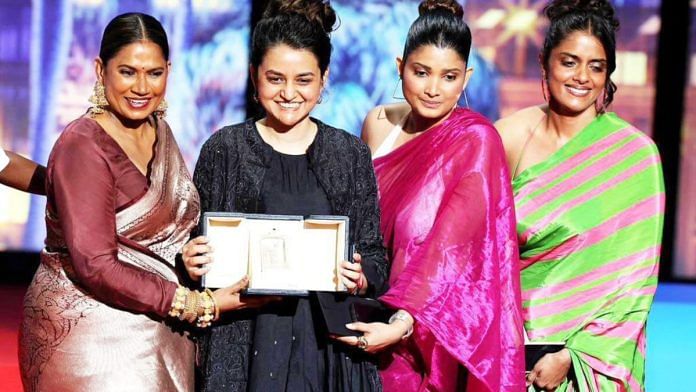New Delhi: Payal Kapadia’s Cannes award-winning film, All We Imagine as Light, is a tribute to Mumbai and female friendships. The three leads—played by Kani Kusruti, Divya Prabha and Chhaya Kadam—navigate the personal and the political in the ever-changing and contradicting metropolitan city.
“This isn’t a city of dreams but of illusions. You have to believe in its (Mumbai’s) illusions, or you’ll go mad,” says a voiceover in the film’s opening shot. Co-produced by France-based Petit Chaos and Indian company Chalk and Cheese Films, it took over five years to make.
Two of the central characters are Malayali nurses Prabha (Kusruti) and Anu (Prabha), who are navigating love and life in the city. Prabha’s husband, who lives in Germany, hasn’t called her for over a year and Anu pursues a clandestine relationship with a Muslim man, Shiaz (Hridhu Haroon). The third female character in the film is hospital cook Parvaty, played by Kadam of Laapata Ladies (2024) fame.
With All We Imagine as Light, Kapadia has just become the first Indian to win the Grand Prix at the Cannes Film Festival. It is the first Indian film in 30 years and the first ever by an Indian female director to be showcased in the main competition. This litany of firsts has made Kapadia the toast of the town—film fraternity to anyone remotely interested in movies has congratulated her and her team for creating history.
The trilingual film—Malayalam, Marathi, Hindi—celebrates women navigating life away from the familiar, comforting environs of home. “Oftentimes, women are pitted against each other…But for me, friendship is a very important relationship because it can lead to greater solidarity, inclusivity and empathy,” Kapadia said during her acceptance speech, as her three leading women stood behind her.
The film, she says, was shaped by the contradictions that make Mumbai. “The film finally grew into one that looks at the city, where a lot of people can find work, but it is also a cruel space. It is apparently a free place, but also its capitalism, the kind of money you need to be happy there—all these contradictions interested me,” Kapadia said in an interview with The Film Companion.
But this is not Kapadia’s first time at the film festival, nor is it her first award.
In 2021, her documentary, A Night of Knowing Nothing, premiered at Cannes and won the Oeil d’Or award for best documentary film. In 2017, her 13-minute short film, Afternoon Clouds, was part of the Cinéfondation student film section at the festival. It was the only Indian film in any category that year and was chosen from 2,600 submissions from film schools across the world.
Also read: Nancy Tyagi at Cannes is instantly iconic. Commenting on Aishwarya Rai is so last decade
Weaving the personal and political
Kapadia’s movies are drawn from personal experiences, be it her schooling or her eventful one-year stint at the Film and Television Institute of India (FTII). As a teenager at Rishi Valley School, a boarding school in Andhra Pradesh, Kapadia was part of the film club where she was exposed to the works of auteurs like Ritwik Ghatak and Andrei Tarkovsky.
After a five-year stint in advertising, Kapadia joined FTII in 2015. Soon after, she led a 131-day protest against the appointment of Gajendra Chauhan as the institute’s chairman. An FIR was also registered against her for allegedly holding then-director Prashant Pathrabe “captive” in his office. The institute cut her scholarship after the incident.
But when Afternoon Clouds was shortlisted for the Cannes Film Festival, the institute went back on its stance and decided to support Kapadia and bear her travel expenses.
Made when she was a third-year student at FTII, Afternoon Clouds is about a Nepali domestic help in Mumbai. Mumbai, blue-collar jobs and romance tie it to her latest project.
Her next outing at Cannes, A Night of Knowing Nothing, covers a series of student-led agitations, from protests after Rohit Vemula’s suicide to those against the Citizenship Amendment Act. Woven into the tapestry of resistance is a story of love, which is every bit as revolutionary as the protests. It follows two lovers, through the letters they wrote to each other. The woman, named L, is a student at FTII and continues a relationship with her estranged boyfriend. They separated when he was forced to quit film school and denied permission from his family to continue dating L just because she belonged to a different caste.
“Love is very political in our country and it is something we keep going back to. I am a very big romantic,” said Kapadia.
All We Imagine As Light will surely set the stage for more films from India to capture the world’s attention. Like Kapadia said on stage, “Don’t wait 30 years for another Indian film.”
(Edited by Theres Sudeep)



